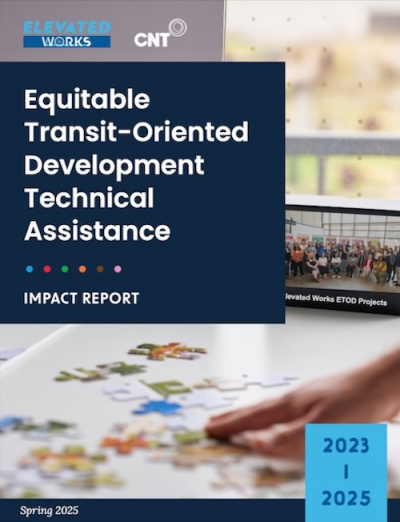
Illinois Counties Can Provide Essential Flood Protection for Their Communities
The Illinois Legislature took a major step toward reducing urban flooding by passing HB4748 and giving 86 Illinois counties the authority to adopt stormwater management plans and standards and provide essential flood protection services to their villages, homeowners and businesses. On May 17, 2018, House Bill 4748 (HB4748) easily passed in the Senate having passed in the House unanimously in March. Illinois has 102 counties, 32 of which meet the definition of “urban”. Under the... Read the rest of this entry »
On the Table 2018: Engaging All Generations in Environmental Justice
CNT was delighted to participate again in the Chicago Community Trust’s On the Table on May 8th, 2018. Over lunch at CNT’s offices, we hosted a range of guests in a conversation about environmental justice. Attendees included chairs and co-chairs from the Robbins and Chatham RainReady community steering committees, students from a local high school, and members of the Elevated Chicago coalition. The topic was “Beyond Baby Boomers: Passing the Torch on Local Environmental Justice,” addressing... Read the rest of this entry »
Community Affordability, Part II
I recently had the honor to sit down with Ben Brown from PlaceMakers to talk about Community Affordability in the PlaceMaker’s blog “PlaceShakers and Newsmakers” CNT has had a long relationship with PlaceMakers, a planning and design firm that works in the United States and Canada. Ben and I spoke about affordability and place, in advance of the Congress for New Urbanism 2018 Conference to be held May 15-19, 2018. Follows is the beginning of Part II of our conversation about... Read the rest of this entry »
Community Affordability: It's Not Just About the House
I recently had the honor to sit down with Ben Brown from PlaceMakers to talk about Community Affordability in the PlaceMaker’s blog “PlaceShakers and Newsmakers” CNT has had a long relationship with PlaceMakers, a planning and design firm that works in the United States and Canada. Ben and I spoke about affordability and place, in advance of the Congress for New Urbanism 2018 Conference to be held May 15-19, 2018. You can read the entire discussion on PlaceMaker’s website Ben... Read the rest of this entry »
Thinking Beyond Costs, Water Systems Innovation
Over and over again we hear that infrastructure in the U.S. has a terrible report card and millions, billions, even trillions of dollars are needed to fix it. Discussed less, however, are the benefits of investing, in particular to upgrade infrastructure beyond the replacement of 100-year-old pipes. We also don’t hear about the high costs of pursuing business as usual—what are we losing by continuing to do things the same way, rather than adapting to changing local needs with systems... Read the rest of this entry »
No Longer Too Cheap to Meter: Water Infrastructure, Equity, and Affordability
The cost of living has been rising across the U.S. even as incomes stagnate. While increases in big ticket items like housing and health insurance make the news, growing water bills have gained less attention. Water was relatively inexpensive for so long that many communities only began to meter usage in recent years. But costs are on the rise and without some proactive solutions the situation is only going to get worse. In municipalities with growing populations or service areas,... Read the rest of this entry »
NAS Shines Spotlight on CNT's RainReady
This month, CNT was thrilled to provide its expertise on the topic of urban flooding and highlight its multi-partner work in Chatham and the Village of Midlothian to the National Academy of Sciences (NAS) as it explores the issue of urban flooding nationwide. Founded in 1863, NAS has served as a private, nonprofit organization providing leading research and guidance on issues of science and technology on a national level. The organization brings together experts from diverse fields to... Read the rest of this entry »
Industrial EcoDistricts Present Major Opportunity as Manufacturing Returns to Urban Communities
There are over 950,000 more manufacturing jobs in the U.S. today than in 2010. This resurgence presents a major opportunity for communities. As a segment of manufacturers turns away from the inefficiencies of sprawling suburban industrial parks and re-onshores production from overseas locations there is growing demand for urban locations. But cities that want to take advantage of manufacturing’s return need to be fully prepared. An EcoDistrict approach to industrial revitalization can help keep... Read the rest of this entry »
Withdrawing from Paris Agreement a Mistake
President Trump’s recent announcement that the U.S. will withdraw from the Paris Agreement on climate change was a disappointing step backward for the nation on one of the greatest global challenges of our era. The impacts of climate change are already happening today—we are seeing flooding communities, droughts, and an increasing frequency of so-called “100 year storms.” Turning a blind eye in the hopes of resurrecting an antiquated, outdated carbon-based economy is not going to make the... Read the rest of this entry »
It's Time to Rethink That Infrastructure Question
It will cost about $4.6 trillion to bring U.S. infrastructure to a state of good repair, according to the American Society of Civil Engineers Infrastructure Report Card released last week. If by some miracle our civic leadership raised all that money and hired the engineering and construction firms to do the work, we'd end up with thousands of examples of state-of-the-art 1950s investments. Let's not do that. Instead, let's acknowledge the costs of outdated approaches that wasted... Read the rest of this entry »





 Strengthening Transit Through Community Partnerships
Strengthening Transit Through Community Partnerships








